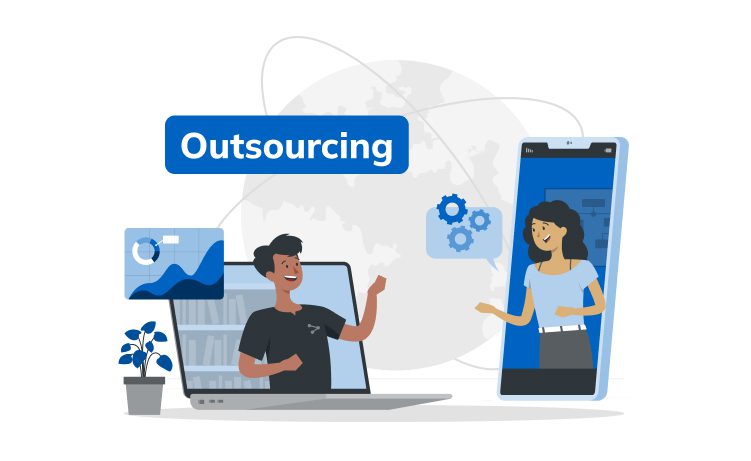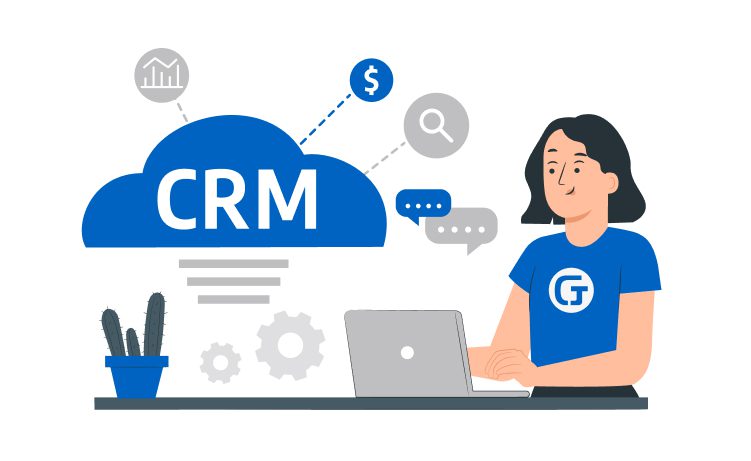
A Step-by-Step Guide to Software Development for Startups



Startups fight for attention in fast-moving markets. Strong custom software development turns an idea into a product people can actually use. It also helps scale without painful rewrites, while keeping software development costs under control. Demand continues to rise: Clutch’s 2025 report values the global software development services market at approximately $570 billion in 2025 and projects it to surpass $1 trillion by 2030. It also cites forecasts that the custom software development market could grow from around $43 billion in 2024 to $146 billion by 2030.
Working with a custom software development company is already a necessity for many startups, but what about the software itself? Do you already have a product idea or the type of software you want to create? Do you have proper team members or a software development partner that can finalize your project? These and more questions go unanswered for the startup founders. That’s why we created this guide to software development for startups to help you understand the best software development practices and guide you through this huge step toward growth.
Content
Speed is risky only when it means skipping the basics. In development for startups, speed should mean shorter feedback loops, fewer delays, and faster learning without sacrificing quality.
That matters because market timing drives competitive advantage. The sooner a product reaches users, the sooner it can collect user feedback, validate the idea, and adjust the roadmap. MVP development is usually the fastest way to do that, because it focuses on core features instead of “everything at once.”
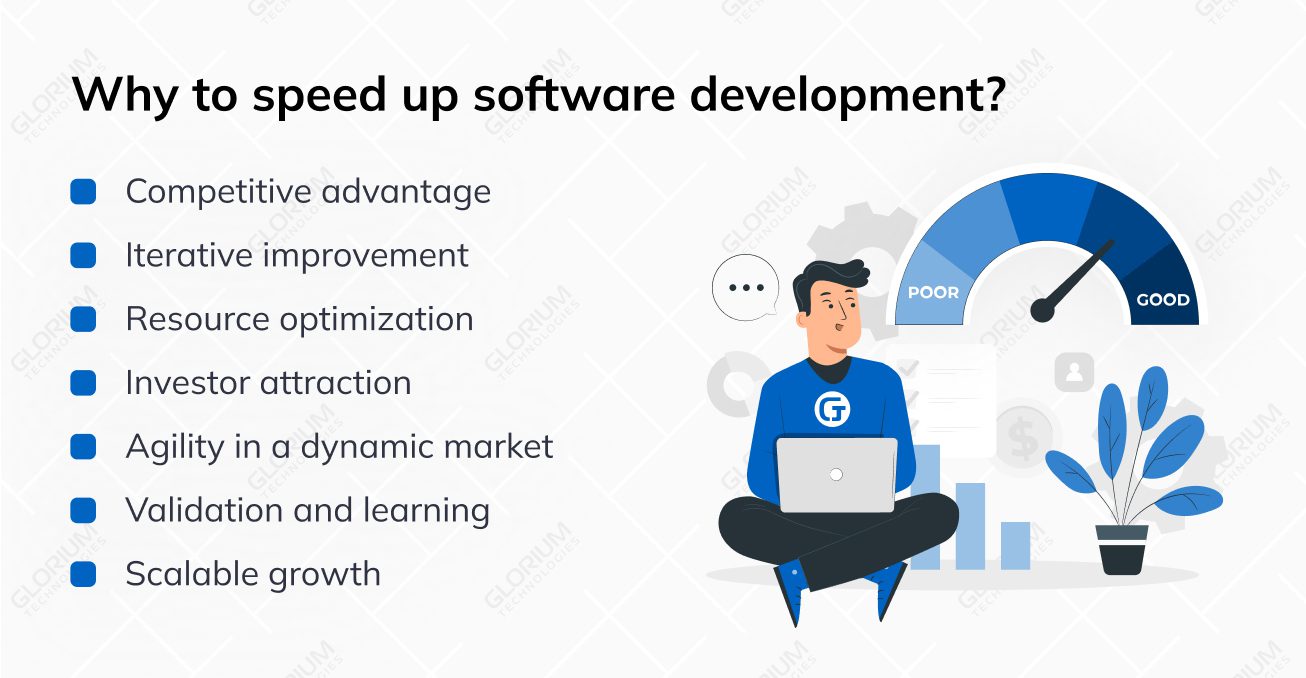
Glorium Technologies supports startup software development with a clear software development process built for fast decisions. The development process starts with quick alignment on business objectives, MVP scope, and the right tech stack. Then development teams run sprints using agile methodology, with frequent demos and visible progress. Continuous testing and automated testing help keep releases stable while new features ship.
This approach improves cost efficiency and helps control software development costs. It also reduces rework, supports scalable cloud infrastructure, and gives startups tailored software solutions that can grow without an early rewrite, one of the biggest wins of working with a custom software development company.
Outsourcing software development can be a smart move when speed is crucial, but hiring too early introduces additional risk. Many startups begin with an in-house team and then encounter common limitations: slow recruiting, a lack of specialized skills, or insufficient development capacity to meet a tight roadmap.
Glorium Technologies supports development for startups through custom software development services that can complement an in-house team or fully cover delivery. Depending on the stage, this may involve a dedicated team, smaller outsourced development teams for specific workstreams, or full product engineering services, from discovery to launch.
Typical situations where outsourcing is the right call:
What strong outsourcing looks like in practice:
Outsourcing is not only about cost efficiency. Done well, it delivers tailored software solutions and innovative solutions that help a startup market successfully, and protect quality.
The way you conduct the whole development process will impact the quality and likability of your products. We recommend working with a startup development company that uses agile practices and has experience working with companies like yours. In this section of the article, we’ll explore a development process step-by-step.
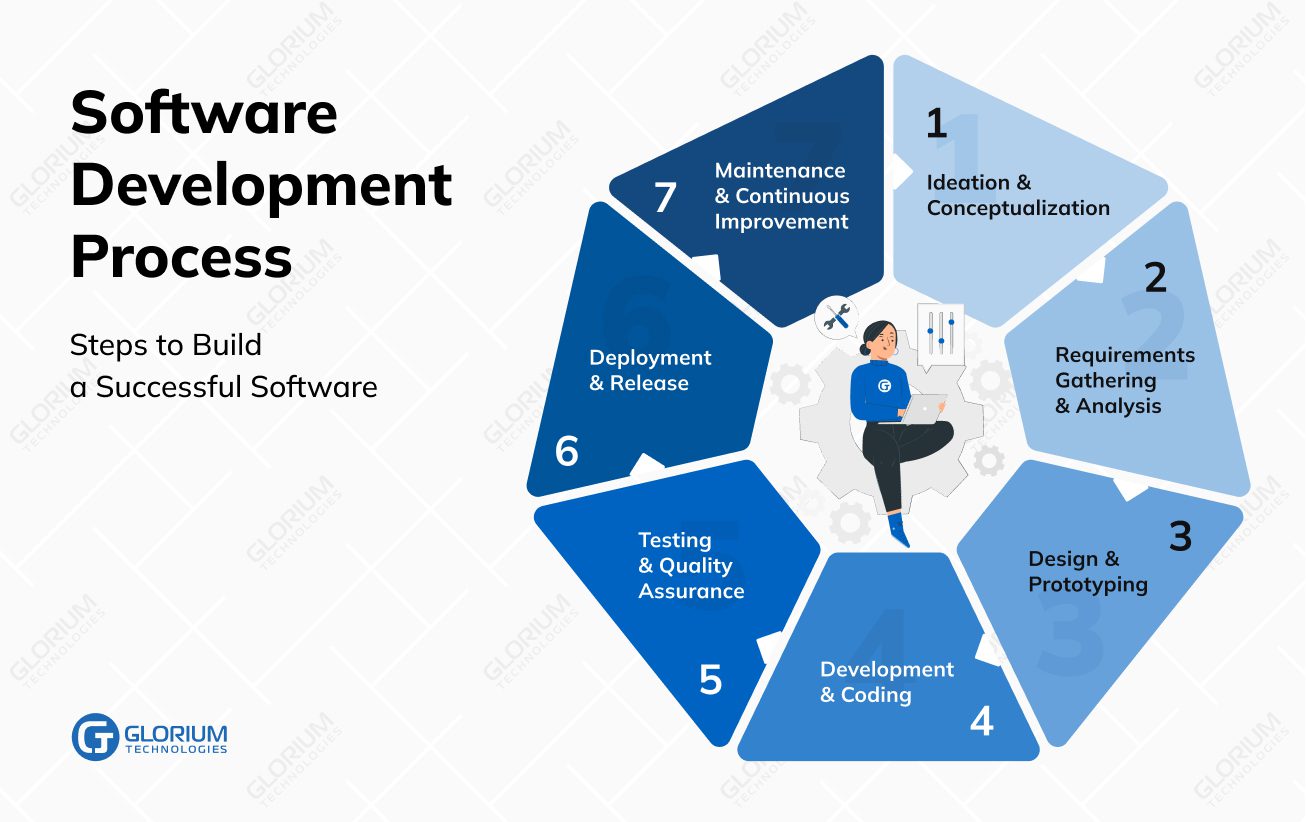
In simpler terms, the first step is to come up with the idea and draft the concept. You can’t skip this step or rush it since it requires brainstorming, identifying market gaps, and envisioning tailored solutions that address the specific needs of your potential customers. At this stage, you need to have a complete idea of your product.
This stage requires getting to know your audience and stakeholders better. We recommend conducting interviews, surveys, and workshops to capture detailed requirements and offer your audience what they need. You must also define the MVP scope, including key features and advanced functionalities.
At this stage, you’ll be able to see how your product will be presented. Professional UI/UX designers and software architects will collaborate to create an intuitive design and infrastructure for your product prototype. You’ll be able to validate your solutions’ functionality, usability, and flow. This stage sets the foundation for the coding phase and plays a crucial role in delivering a user-centric software product.
Finally, we’ve reached coding. At this stage, your solution takes shape. Project managers use agile development methodologies to break the project into smaller and more manageable tasks or user stories. Software developers start writing code, and QA engineers create testing scenarios to identify and fix bugs. This collaboration delivers the first result.
After successfully passing the testing and quality assurance steps, your product is ready for release. A professional company will advise you on the form and timing of deployment, ensuring a smooth launch.
After successfully passing testing and quality assurance steps, your product is ready to see the light of the day. A professional company with experience in software development for startups will advise you on the form and time of deployment, and it’s ready for a smooth launch.
Don’t forget that deployment is not the last step. Once your product is available, you’ll likely encounter some inefficiencies or face updated industry regulations, market demands, and other challenging environments. That’s why, even post-launch, your product requires continuous improvement and maintenance.
Startups often treat security as a “later” problem because speed feels more urgent. That works until the first enterprise client, an audit request, or an incident involving sensitive data. The best time to build secure habits is before the product and the team grow.
Glorium Technologies supports startup software development by embedding security into the software development process from the start. The goal is to protect the product without slowing MVP development or blocking iteration. A secure environment also reduces long-term software development costs, because late-stage security rebuilds are expensive.
Key building blocks of a secure development environment:
It’s time to explore some of the most interesting and available methods of speeding up software development for startups. We’ve worked with various small, medium, and large companies and have used these methods to speed up time to market while maintaining the quality and functionality of products. Here are our most recommended methods:
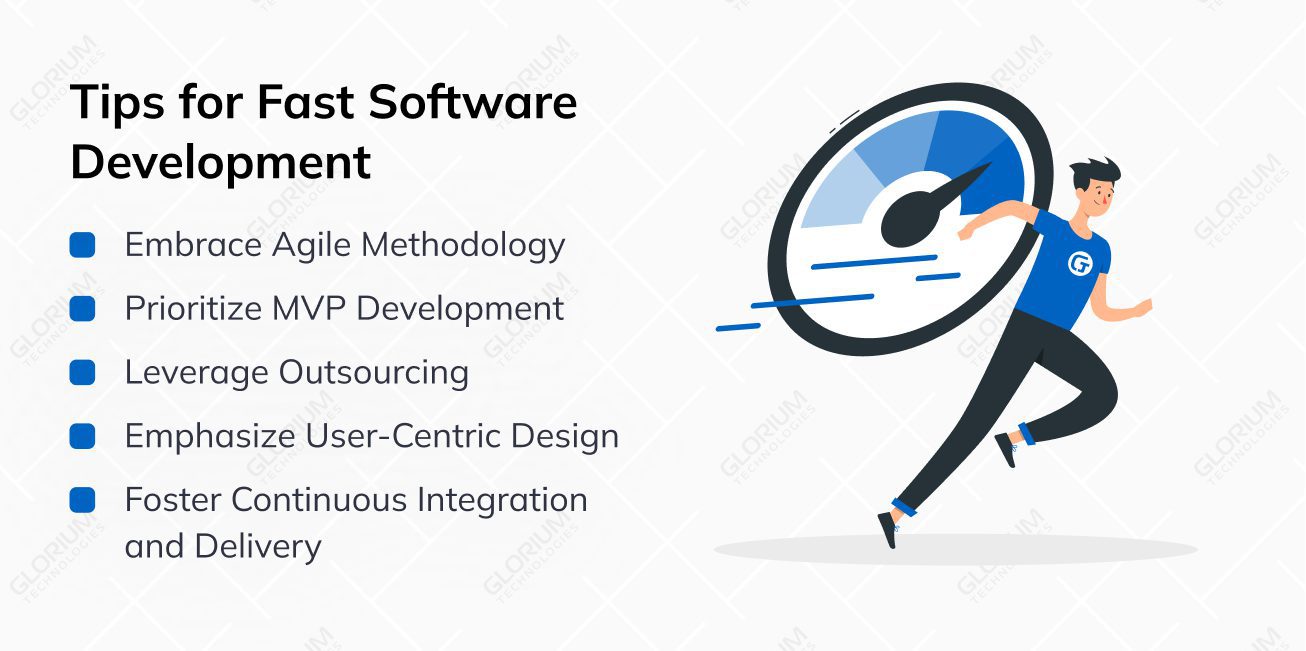
Startups work in environments where dynamics shift regularly and demand changes. That’s why it’s essential to use Agile methodologies, which embrace the changes rather than resist them and prepare companies for adopting new markets and shifts. Agile professionals and PMs break projects into bite-sized elements and create more flexibility. This flexibility allows companies to quickly respond to changes while their competitors are still trying to figure out what’s going on.
One essential tip that we can give to companies for software development for startups is to prioritize working on MVPs rather than jumping into developing the final product. Why? First of all, creating MVP takes much less time than developing a full product. They also give companies flexibility and space to observe how their users interact with their product idea and adjust features and functionalities without major changes to the final product. This approach not only speeds up the time to market but also allows you to deliver the exact product your audience needs without spending extra resources. If you want to work with professionals, we recommend you outsource software development services.
By prioritizing MVP development, startups can minimize the risks associated with building a product that may not resonate with the target audience, enabling them to pivot or iterate early on based on real-world user validation.
It helps to concentrate on the core features, startups can streamline their development efforts and avoid unnecessary complexities. It allows them to release an initial product version sooner, gaining an early foothold in the market and capturing early adopters. The rapid time-to-market provides startups with a competitive advantage and generates valuable user feedback and market insights that can be used to iterate and improve the product.Anna VoznaAccount Executive, Glorium Technologies
One of the ways to speed up software development for startups is to outsource the process to a professional company. Outsourcing has been a popular strategy for companies to speed up the process using external expertise. Companies like Slack, Apple, Google, Skype, and Alibaba outsource some parts of their software creation to external sources. This is a cost-effective method of creating final products with the help of a global talent pool.
What does this mean? Such growth signifies that companies are increasingly adopting outsourcing in their workflows as they recognize the numerous benefits and advantages it comes with, including:
Did you know that 79% of users will look for alternative solutions and sites if they dislike the design of your product? More importantly, up to 88% of online consumers are less likely to revisit a site after having a negative experience with it. UI/UX is a critical factor that attracts and retains new and existing users and dictates your products’s success. Speedy prototyping and MVP creation can tell you a lot about what design and interactions your users prefer and what frustrates them. Such observations will help you release the final product faster.
Don’t leave your product after the deployment. Promote continuous improvement, code changes, bug fixes, design changes, and more. Make sure you’re getting regular feedback from your users and QA specialists that you can use to improve and enhance the quality of your solution. This approach helps companies reduce time spent on changes and updates and quickly respond to market demands.
Startup owners often have to be the jack-of-all-trades. However, wearing multiple hats to keep your business running smoothly isn’t good for you or your company in the long run, especially if you’re developing a tech product. We recommend working with an outsourcing agency that can help you create a solution tailored to your startup’s needs. Here are some essential software development services for startups you can outsource confidently:
You can confidently outsource the above-mentioned services to a professional agency and focus on strategic decisions and your company’s day-to-day workflows.
At Glorium Technologies, we prioritize creating high-quality custom solutions that fit your company like a glove. For a startup, every second matters, so we encourage you to schedule a free introductory consultation with our experts to discuss your project idea, ask questions, and see how we can help you.
That’s a perfectly normal place to start in the startup journey. The first move is to clarify business objectives and idea validation: who the user is, what problem gets solved, and what “success” looks like. From there, the software development process should narrow the MVP development scope to a few key features that can be built fast and tested with real users. This is where user feedback gives valuable insights before the software project gets expensive. A good development company can help shape the tech stack and cloud infrastructure early, so the product can grow without painful rewrites later.
Glorium Technologies is a development company that delivers startup software development from MVP to scale. Typical custom software includes SaaS products, web platforms, mobile apps, marketplaces, admin panels, and internal tools. Custom software development services also encompass product engineering services, including UI/UX design, cloud infrastructure setup, automated testing, and software compliance basics as needed. For startups exploring artificial intelligence, projects may include features like natural language processing or computer vision, depending on the use case and budget.
Speed depends on how quickly the scope becomes clear. If requirements are already defined, development teams can start soon after the roadmap, priorities, and team setup are agreed upon. If the idea is still forming, a brief discovery step typically accelerates the entire development process by minimizing rework. Startup software development normally employs an agile methodology, with a project manager to track progress, and frequent demos to facilitate simple decision-making.
Yes, post-launch support is available, including ongoing support and technical support. This typically encompasses monitoring, security updates, bug fixes, performance tuning, and introducing new features without disrupting existing functionality. The support model can be tailored to match the stage: a dedicated team for steady releases, or a smaller setup that works alongside an in-house team or your own team for cost efficiency. Continuous testing and automated testing also help maintain stable quality as the product evolves.
Software development costs vary significantly because they are driven by the MVP scope, the complexity of core features, the number of platforms, integrations, and expectations regarding software compliance, testing, and secure infrastructure. The technology stack and cloud infrastructure choices also affect both build cost and long-term operating cost. Team model matters too: an in-house team incurs hiring time and overhead, whereas outsourcing often results in a clearer, predictable monthly delivery cost with a stable development capacity. The most realistic estimate typically emerges after the MVP development scope is defined, as this is where the budget stops being a guess and becomes a plan.
Since our team uses agile methodologies, we’ll be able to adapt to changing requirements and make sure your product aligns with your vision even in the middle of the process.
Yes. We build flexible solutions that can easily be integrated with pre-existing systems and tools.
You can implement continuous testing and quality assurance. We recommend working with professionals who can help you identify potential inefficiencies quickly so you don’t launch a low-quality product while trying to speed up the process. This way, you can mitigate risks, reduce rework, and deliver reliable programs faster.
We prioritize effective team collaboration and communication during regular and speedy processes. We use Agile methodologies to split projects into bite-sized elements and manage them individually, update each other regularly, use collaborative tools, and track updates in a single source. Such an approach not only creates products faster, but guarantees minimal disruptions and high quality.
Continuity is essential for every company, especially for startups that see regular growth. That’s why we recommend embracing scalable technologies, building custom solutions, and fostering a culture of innovation. Regularly evaluate and improve your practices, use cloud infrastructure for better flexibility, encourage continuous learning among your team members, and work with professionals to delegate high-risk jobs.




